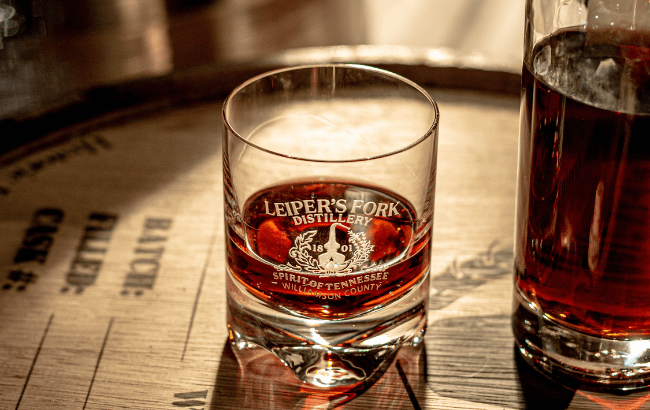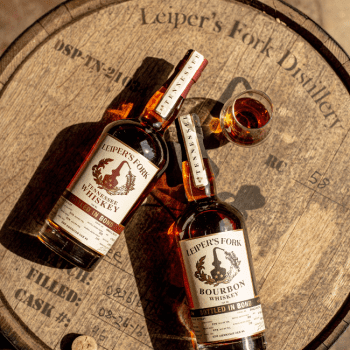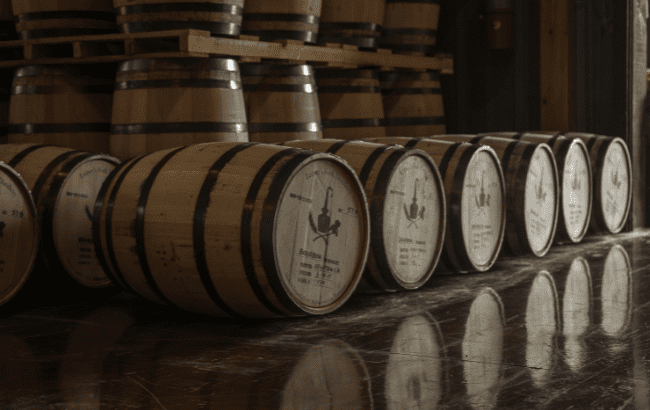This website uses cookies so that we can provide you with the best user experience possible. Cookie information is stored in your browser and performs functions such as recognising you when you return to our website and helping our team to understand which sections of the website you find most interesting and useful.
Leiper’s Fork champions pre-Prohibition production
By Georgie CollinsTennessee-based Leiper’s Fork distillery has looked to the forgotten production methods of America’s pre-Prohibition era to create its small-batch American whiskey.

The independent family-owned brand, located in the eponymous village of Leiper’s Fork, south of Nashville, was the first legal distillery in the town in more than 100 years, and filled its first barrels in the spring of 2016.
The distillery has taken a unique approach to its whiskey production, drawing on the ‘lost art’ of small-batch whiskey making that was prevalent prior to the beginning of US Prohibition in 1920.
This approach includes the prioritisation of pre-Prohibition distillation techniques, and a grain-to-glass approach. As such, the distillery utilises local heritage varieties of corn, wheat, rye and barley, all of which are harvested from the nearby Harpeth River Valley, and uses a 500-gallon Scottish swan neck pot still that has been custom-built by Vendome Copper & Brass.
Lee Kennedy, president and chief distiller of Leiper’s Fork, told The Spirits Business: “All whiskey going back to the 1500s was made on a pot still, and so to me it’s very traditional to the whiskey industry.
“I love the efficiency of a column still, but we’re not making vodka and gin – we’re a whiskey house.”
The brand currently offers two whiskeys, both of which will be available purchase in the UK for the first time this summer.
Pre-Prohibition production

The first, Leiper’s Fork Tennessee Whiskey, has gone through the Lincoln County Process, being filtered through sugar maple wood charcoal chips before going into casks for ageing. It is made from a mash bill of 70% corn, 15% rye, 15% malted barley, and has been aged for four years.
The second whiskey, Leiper’s Fork Tennessee Bourbon, is made from a bill of 70% corn, 15% wheat and 15% malted barley, and has also been aged for four years.
This wheated Bourbon ‘excites and enlivens the palate’ with classic flavours of butterscotch and dried citrus.
“We treat our malt as a flavouring grain” Kennedy explained. “So we pay more for that. And we use 15%, while most American distilleries are using five to 10%. So that’s another differentiation of our whiskeys.”
Kennedy noted that by using pot distillation, the brand has pulled moves from the malt Scotch whisky playbook. “Pot-distilled whiskies tend to have a heavier mouthfeel, like ours do. We’re non-chill-filtered as well, so they also have a kind of a silky, velvety mouthfeel on the palate,” he said, “that’s why we’re hell-bent on using pot distillation.”
Another key pre-distillation technique employed by the distillery is the sweet mash fermentation process – an age-old technique that is only incorporated by a handful of distilleries across the US.
“In a traditional sour mash cooking process, you’re taking your back-set from the first run and you’re introducing that into your mash water in your subsequent mash cooking,” Kennedy explained. “The reason they used to do that back in the old days is they were ‘pH-ing’ the water down.
“Optimum pH going into fermentation is about 5.2pH, so they would use that to add acidity to their mash water. The reason they did that is it was a continuity of taking DNA from one batch and introducing it into the next, but with sweet mash, we don’t do that – we start with a fresh batch of mash and water every time.”
By not adding sour or acidic back-set to the mash, the resulting whiskey gains a soft and mellow character.
In addition, the sweet mash process is a lot more environmentally friendly because “you never bring your water to boil, and so it’s using a lot less energy. We heat the water to about 200 degrees Fahrenheit (93 degrees Celsius), and then we shut all of our steam off,” Kennedy said.
He noted that the sweet mash fermentation process “kind of fell out of favour” after Prohibition, as local whiskey production was all but wiped out in the US in favour of large corporate distillers. Now, the sweet mash process is only utilised by a handful of American distilleries, but “it’s just now finding a foothold again” Kennedy added.
“I just love the history and the process behind malting grains. Obviously, you couldn’t have a fermentation without malt, so for me it all starts there.”

Small-batch distillery
Finally, Leiper’s Fork differentiates itself by adhering to the 1897 Bottled-in-Bond Act.
Bottled in Bond (BIB) is a label for an American-produced distilled beverage that has been aged and bottled according to a set of legal regulations contained in the US government’s Standards of Identity for Distilled Spirits.
By adhering to these rules, Leiper’s Fork provides a statement of provenance to its whiskey, which in turn places an emphasis on its consistency and offers a level of protection to its consumers regarding the legitimacy of the spirit inside the bottle.
Furthermore, by producing only 25,000 gallons of whiskey annually under this pre-Prohibition method, and filling between 10 and 20 casks per batch, Leiper’s Fork can be called a truly genuine small-batch distillery.

